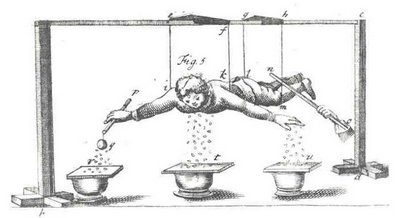I like the Los Angeles Review of Books quite a lot. I’ve given them real, actual money. But this article by James Harkin on Marx and public choice theory is, to put it plainly, shit. Below the fold, a lengthy and repetitive diatribe, which I’m posting less because I think it will be especially entertaining to readers, than to do my little bit to discourage others from writing similar articles in the future. Also, perhaps it might get LARB to rethink their quality filters.Taking various claims stated by the argument in turn …
(1) The claim that there is “a distinctive approach to political economy, sometimes known as game theory or public choice theory” is itself rather … distinctive. Public choice theory is not the same thing as game theory. Not only is the preponderance of classic public choice theory decidedly non-game theoretic, but many public choice theorists are actively suspicious of game theory. See e.g. Charles Rowley’s introductory essay to the standard collection of classic public choice articles, which hints strongly at the deviant tendencies of the ‘Rochester’ (i.e. game theoretic) school (which after all might suggest that market failure, as well as government failure is endemic in strategic situations). Game theory is a set of analytic tools, which, whether you like them or not, are compatible with a wide variety of political approaches. Public choice is a set of tools combined with an explicit ideology – in the words of the aforementioned Professor Rowley (a long time editor of Public Choice) it is “a program of scientific endeavor that exposed government failure coupled to a programme of moral philosophy that supported constitutional reform designed to limit government.”
(2) “Public choice political economy was born out of American military think tanks in the late 1940s, and set itself the task of dissecting the burgeoning role of government in advanced industrialized economies.” Oh dear. Game theory did get some impetus from American military think tanks (I’m travelling, but I recall William Poundstone’s book being good on this), but because it was perceived as being useful for military strategy, that being what military think tanks are in the business of caring about. Public choice theory really gets going in the 1950s, and is descended from a different line of inquiry in economics – social choice theory. This non-game theoretic approach builds on theoretical work by Kenneth Arrow (who’s incidentally as social democratic as they come) and Duncan Black.
(3) “As public choice theory has spread its influence across the entire social sciences in the last 70 years, this central idea that society is made up of no more than self-interested, strategically aware individuals gave rise to “rational choice theory” and became central to the entire Western social sciences.” This is exactly backwards. Rational choice theory gave rise to public choice theory, not vice-versa.
(4) “An example: the prisoner’s dilemma collective action problem, the most glittering weapon in public choice theory’s armory — quite simply one of the most important and most intractable logical puzzles of the last 100 years.” Prisoner’s dilemma and collective action are two distinct concepts. Mancur Olson’s seminal work on the collective action problem is entirely non-game theoretic,and makes no reference to the prisoner’s dilemma. As best as I know, the first book to systematically analyze collective action problems in terms of the prisoner’s dilemma is Russell Hardin’s 1982 Collective Action, which spurred responses from Michael Taylor and others pointing out that other logics (assurance games; chicken) could equally well underly collective action dilemmas.
(5) “The idea of the prisoner’s dilemma, which subsequently became the collective action problem or the “free rider problem,” As noted – the collective action/free rider problem was initially formulated by Olson without any reference to the prisoner’s dilemma. Prisoner’s dilemma is one useful way you might formalize the analysis of a particular kind of collective action problem, if you wanted to use game theory. That’s all.
(6) “In the last 50 years, [prisoner’s dilemma] has troubled the best mathematicians and social scientists of the modern era, and has been an ideological plaything and a weapon in the battle of political ideas. Intellectuals of every different stripe have fought over who owns the prisoner dilemma game because within it lies clues as to how to answer key social questions: how to organize society, the role of the market, the role of pressure groups, the purpose and prospects for collective mobilization, when the state should intervene to provide public goods for its citizens.” This potted intellectual history is not only terribly written (“an ideological plaything and a weapon in the battle of political ideas” …”every different stripe”) but wildly eccentric. Prisoner’s dilemma is an interesting and useful game for many purposes. It is not, nor does anyone consider it, a master-key to the great and enduring questions of the social sciences.
(7)”Brilliant economists like James Buchanan (who died in January) went on to argue that all kinds of collective action were bound to fall victim to the free rider problem; their conclusion, by and large, was that both politics and government were hardly worth the bother.” I think that the author is trying to describe some garbled version of Buchanan’s arguments about rent seeking but can’t be entirely sure. The claim that Buchanan thinks that politics and government “were hardly worth the bother” is decidedly peculiar – Buchanan’s criticism of government was most certainly not that it was barely worth any effort.
(8) “By the 1970s thinkers working within the new discipline of “law and economics” set about raiding game theory to explain the stuff of everyday life. The Chicago economist Gary Becker borrowed this calculus of material self-interest to explain the workings of marriage and the family: we marry in order to maximize our long-term utility, reckoned Becker, and according to strict laws of supply and demand.” The last time I looked, Becker’s arguments about the family were not game theoretic, nor inspired by game theory. If you really wanted to be pedantic, you could say that they implicitly invoke Von Neumann-Morgenstern utility functions, but I don’t imagine that the author of this piece would know a Von Neumann-Morgenstern utility function if it bit him on the arse.
(9) “Coase’s contribution was to argue that harmful effects could be resolved by means of a simple logical bargain between its immediate perpetrator and victim and without the intervention of the state or anyone else. If the flowers in your garden are aggravating my hay fever, for example, both of us could come together to find a solution. All that was required, he maintained, was a legal system that allocated rights to each party. After that, it was up to the bargaining parties to trade their rights depending on how much their respective activities were worth to them.” As a respected English economist (who by a bizarre coincidence is also called Ronald Coase) has noted, this interpretation (while regrettably common) completely misses the intended point of the argument about social cost. Coase ‘maintained’ and maintains no such thing.
There’s much more I could say. Some of the claims about Marx are nearly as remarkable as the author’s cockeyed understanding of public choice – e.g. the claim that Marx retired from active politics after 1848 to think great abstract thoughts about social theory will come as a surprise to his biographers. But that’s likely more than enough to give a general picture. It’s perfectly reasonable that a wide variety of people on the left don’t like public choice theory as it is currently formulated (I’m not especially fond of it myself). But if you want to criticize it, you need to understand it. The willingness of otherwise good publications to publish sloppy polemics about economic theory, as long as they have the right politics, is highly unfortunate. I’d like to think the LARB will do a better job in future.


